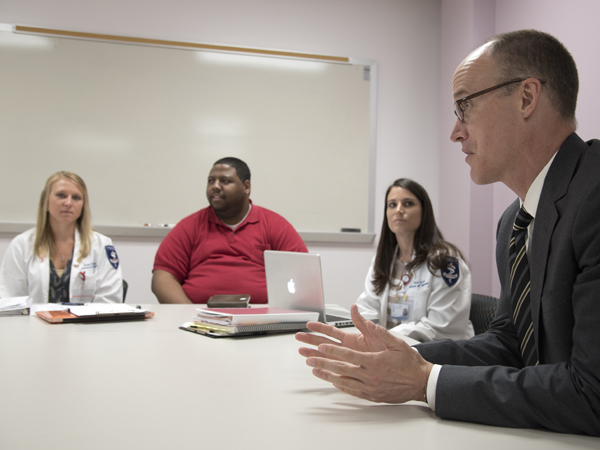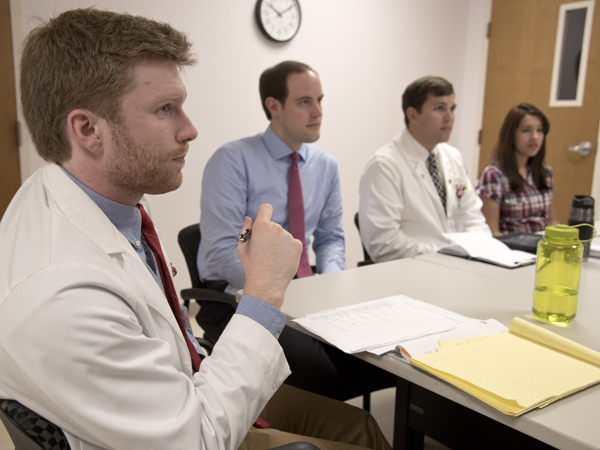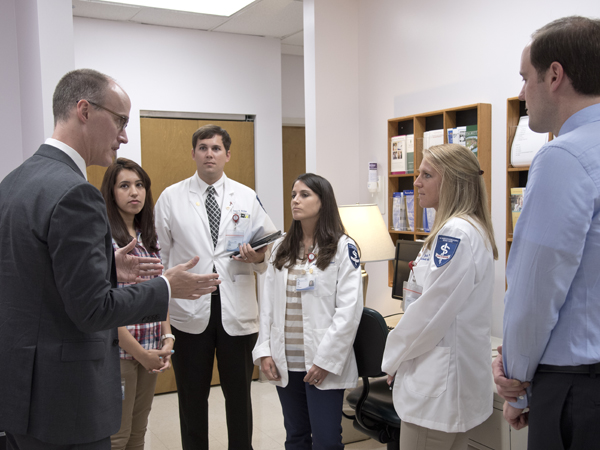For students of psychiatry, it’s drive time

Normally, medical students taking psychiatry courses here have been treated like passengers: They were driven to their destinations.
Now, with the July launch of a new education program, they'll be taking the wheel.
Helping to put them in the driver's seat is Dr. Scott Rodgers, chair of the Department of Psychiatry and Human Behavior, where the traditional passive learning vehicle is being traded in for a more active, cutting-edge model.
This shift, which will extend also to psychiatry residents as early as next year, relies less on lectures in favor of an online learning recipe of podcasts, video presentations of patient interviews, and pre- and post-self-assessment quizzes.
"We're modernizing the way we teach and train psychiatrists," said Rodgers, chair of the department since December.
"With lectures, some students tend not to pay close attention, and they leave without understanding what they need to know.

"What we're offering instead is adult learning - meaningful and clinically relevant. The students and residents understand why we are teaching it; and it needs to be timely."
Timeliness is covered by the introduction of Behavioral Specialty Clinics. Housed in the department's facilities in the Jackson Medical Mall, each clinic is devoted to a specific disorder, addiction or other condition attached to a certain day of the week.
For instance, if it's Monday, it's mood anxiety disorders day. This is a switch as well. Previously, the clinics offered general psychiatry only.
Another change: Students will perform more clinical work - and their learning material will match the types of patients they see immediately.
While July 1 was the official launch date of the program, learning modules will be ready for unveiling a month later, said Dr. Mohadetheh "Roya" Moulana, instructor and curriculum development director, who was responsible for creating them.
"August 3 - that's the big day," she said.
"The students will watch a video, listen to a podcast, read a scientific article, then the next day go to the clinic and see a patient with related symptoms or disorders.
"After three hours visiting patients, they have a wrap-up session with psychiatrists, psychologists and basic scientists familiar with neuroscience research."
In theory, this method of active learning meets the needs of individuals, Moulana said. "It enhances the average learning retention rate."
This strategy will shape the residents' world as well, said Dr. Joy Houston, assistant professor of psychiatry and Adult Residency Training Director.
"Until now, we've had an everybody-into-the-pool approach. When the learning is directly related to the type of patient you're seeing, there's a sense of immediacy. The material sticks better."
And as residents become more familiar with the latest findings in psychiatry, "we will bridge the gap between research and practice," Moulana said. "I believe this can lead to more effective mental health treatment."

For medical students, this new era in education will enlighten four weeks of their training - the length of their clerkship in clinical psychiatry, arriving during their third year.
But for the batch of four incoming residents, it will mean a sea change of up to four years - the duration of a psychiatry residency.
"They'll experience some of the changes right away," Houston said, "but residents won't have their own, separate online modules until next year."
Patients should benefit, too, Rodgers said. The clinics will no longer be limited to prescribing medications; they'll offer therapy as well.
"Outpatient psychotherapy has been offered before, but not at the Medical Mall," Rodgers said.
Most of the department's 40-plus-member faculty will be involved in the specialty clinics. They will become part of an active learning trend that has caught on in other professional schools, including law schools, Rodgers said.
The Medical Center model is based in part on what Rodgers learned at Vanderbilt University, where he last served as associate dean for Medical Student Affairs. His faculty here recommended the specialty clinics.
In either case, the goal is to demonstrate that the department is innovative and creative, he said. This could pay off eventually for Mississippi, where there is a "tremendous need" for psychiatrists.
Across the country, in fact, psychiatry is attracting fewer medical school graduates despite a growing demand, as reported in 2014 by Merritt Hawkins, a physician search and consulting firm.
"We want people to know that coming here to train in our residency program is a good idea," Rodgers said. "I definitely believe we can compete with the best programs in the country."
As for medical students, he said, "we want to give them a solid understanding of good mental health in their patients and when to start treatment or make referrals."
There's also the stigma of mental illness to confront, Rodgers said. "You want students graduating from medical school saying, 'This is part of the human condition; it can happen to the best of us.'"


